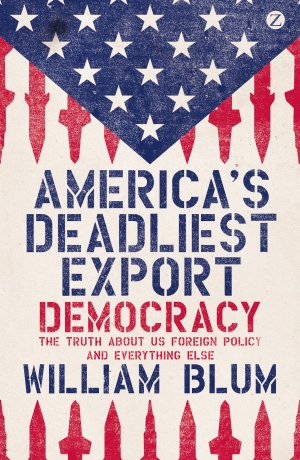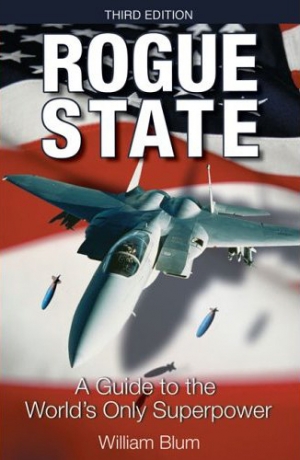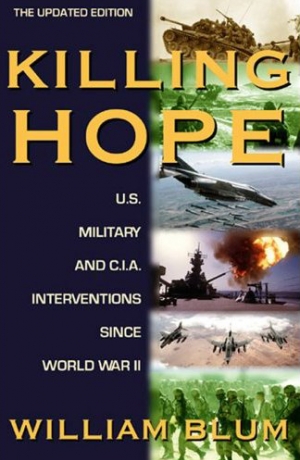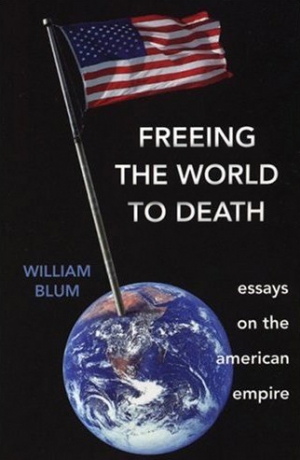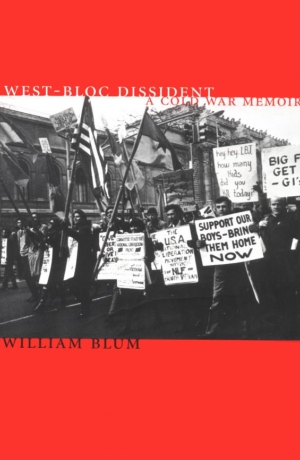The Anti-Empire Report #56
By William Blum – Published March 29th, 2008
Propaganda as an Olympic competition
The latest protests in Tibet and crackdown by Chinese authorities have brought up the usual sermonizing in the West about Chinese government oppression and illegitimate control of the Tibetans. Although I have little love for the Chinese leaders – I think they run a cruel system – some proper historical perspective is called for here.
Many Tibetans regard themselves as autonomous or independent, but the fact remains that the Beijing government has claimed Tibet as part of China for more than two centuries. The United States made its position clear in 1943:
The Government of the United States has borne in mind the fact that the Chinese Government has long claimed suzerainty over Tibet and that the Chinese constitution lists Tibet among areas constituting the territory of the Republic of China. This Government has at no time raised a question regarding either of these claims. 1
After the communist revolution in 1949 US officials tended to be more equivocal about the matter.
Even as the Chinese were attacking Tibetan protestors, New York City Police were beating up and literally threatening to kill “Free Tibet” protestors in front of the United Nations. It’s all on video.
The Washington Post recently ran a story about how the Chinese people largely support the government suppression of the Tibetan protesters. The heading was: “Beijing’s Crackdown Gets Strong Domestic Support. Ethnic Pride Stoked by Government Propaganda.” The article spoke of how Beijing officials have “educated” the public about Tibet “through propaganda”. 2 That’s a rather interesting concept. Imagine the Post or any other American mainstream media saying that those Americans who support the war in Iraq do so because they’ve been educated by government propaganda. … Ditto those who support the war in Afghanistan. … Ditto those who supported the bombing of Yugoslavia. … Ditto scores of other US invasions, bombings, overthrows, and miscellaneous war crimes spanning more than half a century.
Now Germany’s foreign minister has warned China that its response to the crisis in Tibet may jeopardize the Summer Olympics in Beijing. “The German federal government is saying to the Chinese government: be transparent! We want to know exactly what is going on in Tibet.” He also warned China to avoid any violent measures in its standoff with Tibetan protesters. 3 Human rights organizations have demanded that Coca-Cola, Visa, General Electric, and other international companies explain their dealings with the Chinese government as it prepares to host the Summer Games. The French Foreign Minister floated the prospect of boycotting the Games’ opening ceremony because of China’s response to the protests. And the president of the European Parliament said European countries should not rule out threatening China with a boycott if violence continued in Tibet. 4
It’s nice to see the West’s conscience stirred up. They’re real good about such things, when the target is not one of their own, particularly against a communist country. In 1980, 62 nations – including the United States, Canada, West Germany, Japan, and Israel – boycotted the Olympics in Moscow because the previous year the Soviet Union had invaded Afghanistan. Four years later, the Olympics were held in Los Angeles. Not a single member of “The Free World” boycotted it, even though the previous year the United States had invaded Grenada and overthrown the government, with a lot less political justification than the Russians had for invading Afghanistan. The Grenada invasion was as much lacking in legality and morality as the invasion of Iraq in 2003.
The Soviet Union and 13 of its allies stayed away from the Los Angeles Olympics, but when the Russians announced the boycott they cited only security concerns. President Reagan had declared at the time of the invasion that Grenada was “a Soviet-Cuban colony being readied as a major military bastion to export terror and undermine democracy, but we got there just in time.” 5 One would think that Moscow would have mentioned Grenada at least for the satisfaction of throwing Afghanistan and the 1980 boycott in Washington’s face. The fact that the Russians made no such mention was a measure of how unconcerned they were about the tiny island nation and its alleged future as a major Soviet military bastion. The magnitude and variety of Reagan administration lies that accompanied the invasion of Grenada may have stood as a record until the Bush administration topped it in Iraq 20 years later. 6
“In politics, as on the sickbed, people toss from one side to the other, thinking they will be more comfortable.” – Johann Wolfgang von Goethe
A recurring theme of Hillary Clinton’s campaign for the presidency has been that she has more of the right kind of experience needed to deal with national security and foreign policy issues than Barack Obama. The latest play on this is her advertisement telling you: It’s three a.m. and your children are safe and asleep; but there’s a phone in the White House and it’s ringing; something really bad is happening somewhere; and voters are asked who they want answering the phone. Of course they should want Hillary and her marvelous experience. (If she’s actually explained what that marvelous experience is, I missed it. Perhaps her near-death experience in Bosnia?)
Typical of Clinton’s growing corps of conservative followers, the Washington Times recently lent support to this theme. The right-wing newspaper interviewed a group of “mostly conservative retired [military] officers, industry executives and current defense officials”, who cite Mr. Obama’s lack of experience in national security. 7
And so it goes. And so it has gone for many years. What is it with this experience thing for public office? It was not invented by Hillary Clinton. If I need to have my car repaired I look for a mechanic with experience with my particular car. If I needed an operation I’d seek out a surgeon with lots of experience performing that particular operation. But when it comes to choosing a person for political office, the sine qua non consideration is what their politics are. Who would you choose between two candidates – one who was strongly against everything you passionately supported but who had decades of holding high government positions, or one who shared your passion on every important issue but had never held any public office? Is there any doubt about which person almost everyone would go for? So why does this “experience” thing keep coming up in so many elections?
A recent national poll questioned registered voters about the candidates’ “approach to foreign policy and national security”. 43% thought that Obama would be “not tough enough” (probably a reflection of the “experience” factor), while only 3% thought he’d be “too tough”. For Clinton the figures were 37% and 9%. 8 The evidence is overwhelming that decades of very tough – nay, brutal – US policies toward the Middle East has provoked extensive anti-American terrorism; the same in Latin America in earlier decades, 9 yet this remains an alien concept to most American voters, who think that toughness works (even though they know it doesn’t work on Americans – witness the reaction to 9/11).
John McCain, who is proud to have dropped countless bombs on the people of Vietnam, who had never done him or his country any harm until he and his country invaded them, who now (literally) sings in public about bombing the people of Iran, and who tells us he’s prepared to remain in Iraq for 100 years, is still regarded as “not tough enough” by 16% and “too tough” by only 25%. What does it take to convince Americans that one of their leaders is a bloody psychopath? Like the two psychos he may replace. How has 225 years of our grand experiment in democracy wound up like this? And why is McCain regularly referred to as a “war hero”? He was shot down and captured and held prisoner for more than five years. What’s heroic about that? In most other kinds of work, such a record would be called a failure.
Winston Churchill said that “The best argument against democracy is a five-minute conversation with the average voter.” And if that doesn’t do it for you, try a five-minute conversation with almost any American politician. This thing called democracy continues to be used as a substitute for human liberation.
One parting thought about Obama: Is he prepared to distance himself from Rev. Martin Luther King as he has from his own minister, Rev. Jeremiah Wright? King vehemently denounced the Vietnam War and called the United States “the most violent nation in the world”. Like Wright, he was strongly condemned for his remarks. As T.S. Eliot famously observed: “Humankind can not bear very much reality.”
Do Americans live in a democracy or in an economy?
The Dow Jones industrial average of blue-chip stocks: On March 19 it increased 420 points; On March 20 it went down 293 points; On March 21 it increased 261 points.
Do the economic fundamentals change dramatically overnight? Or is our economic system as psycho as John McCain?
The US economy is teetering on the edge of recession because for a long time banks and others were selling mortgages at subprime rates to people who were bad credit risks. They sold them the mortgages anyhow because they knew they could combine these questionable mortgages into bundles and sell them to financial speculators higher up on the food chain. The higher speculators in turn sold bundles of various debt instruments to other speculators. The supposedly objective credit rating agencies told everyone that these firms and their bundles were good investments, but the credit rating agencies in fact had played a role themselves in putting some of the bundles together. This convoluted system created such complex and deliberately opaque financial vehicles – all devised to make someone a buck every time they swapped some paper – that they long ago had lost track of the papers’ true value. We had a financial system terminally choked with worthless paper “instruments”. A genuine house of cards. It fell.
We go from the dot-com bubble to the stock market bubble to the Enron bubble to the housing bubble to the credit bubble … capitalist growth increasingly being driven by speculative bubbles, which invariably burst, and with each burst many thousands lose jobs, and, currently, their homes.
Can anyone say with any kind of precision how the price of gasoline at the pump is arrived at each day? And exactly what the relationship is, if any, between that price and the price of oil on the mercantile exchanges which are regularly announced as the “official” price of a barrel of oil? And why the speculators who spend their days playing buy-and-sell games at these exchanges – while having no actual personal contact with barrels of oil – should have such a profound effect upon our daily lives? And why gasoline is priced at $3.40.9 per gallon? Or $3.24.9 per gallon? That’s 9/10 of a penny.
And while we’re at it … Why is almost everything in American society priced at amounts like $9.99, $99.99, or $999.99? Or $3.29 or $17.98?
“If all economists were laid end to end, they would not reach a conclusion.” – George Bernard Shaw
Marketing is about creating emotional, even irrational bonds between your product and your target audience. There was a time when capitalism strove, much more than now, to meet the real needs of people. Now its forte is creating artificial needs with advertising and filling them, like bottled water. And how do they get away with it? Because you’ll believe anything. Even that bottled water is purer than tap water.
“It is difficult to produce a television documentary that is both incisive and probing when every twelve minutes one is interrupted by twelve dancing rabbits singing about toilet paper.” – Rod Serling, famed TV writer
“Get off this estate.”
“What for?”
“Because it’s mine.”
“Where did you get it?”
“From my father.”
“Where did he get it?”
“From his father.”
“And where did he get it?”
“He fought for it.”
“Well, I’ll fight you for it.” – Carl Sandburg
Can it be imagined that an American president would openly implore America’s young people to fight a foreign war to defend “capitalism”? The word itself has largely gone out of fashion. The approved reference now is to the market economy, free market, free enterprise, or private enterprise. This change in terminology endeavors to obscure the role of wealth in the economic and social system. Simply naming the system, after all, might imply that there are others. And avoiding the word “capitalism” sheds the adverse connotation going back to Karl Marx.
At some unrecorded moment a few years ago, the egg companies of America changed their package labels from small, medium and large to medium, large and jumbo. The eggs remained the same size.
“The Federal Trade Commission concluded that there is very little connection between what drug companies charge for a drug and the costs directly associated with it.” 10
“The makers of aspirin wish you had a headache right now,” says the graffiti.
Slavery is the legal fiction that a person is property and corporate personhood is the legal fiction that property is a person.
“The private-benefit corporation is an institution granted a legally protected right – some would claim obligation – to pursue a narrow private interest without regard to broader social and environmental consequences. If it were a real person, it would fit the clinical profile of a sociopath.” – David Korten
Ralph Nader once charged the Justice Department anti-trust division with going out of business without telling anyone.
Capitalism as practiced in the United States is like chemotherapy: it may kill the cancer cells of consumer shortages, but the side effects are devastating.
Many workers are paid a wage sufficient to allow them to keep on living, even if it’s not a living wage. Here’s a radical solution to poverty – pay people enough to live on.
“The paradox is that, three centuries after America’s colonial beginnings, wealth and income are more unequally distributed in the ‘New World’ than in most of the nations of Europe.” 11
How many Americans realize that they have a much longer work week, much shorter vacations, much shorter unemployment coverage, much worse maternity leave and other employee benefits, and much worse medical coverage than their West European counterparts?
Expressing elementary truths about the oppression of the poor by the rich in the United States runs the risk of being accused of “advocating class warfare”; because the trick of class war is to not let the victims know the war is being waged.
What do the CEOs do all day that they should earn a thousand times more than schoolteachers, nurses, firefighters, street cleaners, and social workers? Re-read some medieval history, about feudal lords and serfs.
The campaigns of the anti-regulationists imply that pure food and drugs will be ours as soon as we abolish the pure food and drug laws.
“American Airlines, Delta Air Lines, US Airways and Continental Airlines raised round trip fares $10 on most domestic flights to take advantage of strong demand” 12 – a news item from late 2006; similar items can be found before and since. Is that not odd? Raising prices because of strong demand? Raising prices even though they’re already making more money as a result of the increased demand? So the more someone wants something, or the more they need it, the more they have to pay. Yes, it’s the good ol’ law of supply and demand. Economics 101. You have a problem with that? You should. What takes place in the world of economics is 60% power/politics/ideology, 30% psychological, 10% immutable laws. (These percentages are immutable.)
The more you care about others, the more you’re at a disadvantage competing in the capitalist system.
To say that 1% of the population owns 35% of the resources and wealth, is deceptive. If you own 35% you can control much more than that.
How could the current distribution of property and wealth have emerged from any sort of democratic process?
The myth and mystique of “choice” persuades us to endorse the privatization of almost every sphere of activity.
A study of 17,595 federal government jobs by the Office of Management and Budget concluded that civil servants could do their work better and more cheaply than private contractors nearly 90 percent of the time in job competitions. 13
Communist governments take over companies. Under capitalism, the companies take over the government.
The American oligarchy has less in common with the American people than it does with the oligarchies in Japan and France.
If you lose money gambling, you can’t take a tax deduction. But you can if you lose on the glorified slot machine known as the stock market; your loss is thus subsidized by taxpayers.
If the system should cater to selfishness because it’s “natural”, why not cater to aggression which many people claim is also natural.
Do the members of a family relate to each other on the basis of self-interest and greed?
“The idea that egotism is the basis of the general welfare is the principle on which competitive society has been built.” – Erich Fromm, German-American social psychologist,
Capitalism is the theory that the worst people, acting from their worst motives, will somehow produce the most good.
“The twentieth century has been characterized by three developments of great political importance: the growth of democracy; the growth of corporate power; and the growth of corporate propaganda as a means of protecting corporate power against democracy.” – Alex Carey, Australian social scientist
And this, dear friends, is the system the American Empire is determined to impose upon the entire known world.
“The country needs to be born again, she is polluted with the lust of power, the lust of gain.” – Margaret Fuller, literary critic, New York Tribune, July 4, 1845
“When plunder becomes a way of life for a group of men living in society, they create for themselves, in the course of time, a legal system that authorizes it and a moral code that glorifies it.” – Frederic Bastiat, “The Law” (1850)
An ode to five years of heartless destruction of a five thousand year civilization
“Letters My President Is Not Sending” by Naomi Shihab Nye.
Dear Rafik, Sorry about that soccer game you won’t be attending since you now have no …
Dear Fawziya, You know, I have a mom too so I can imagine what you …
Dear Shadiya, Think about your father versus democracy, I’ll bet you’d pick …
No, no, Sami, that’s not true what you said at the rally that our country hates you, we really support your move toward freedom, that’s why you no longer have a house or a family or a village.
Dear Hassan, If only you could see the bigger picture … 14
Notes
- “Foreign Relations of the United States, 1943, China”, Department of State, 1957, p.630
- Washington Post, March 17, 2008, p.12
- Associated Press, March 21, 2008
- Washington Post, March 22 and 23, 2008
- New York Times, October 27, 1983
- William Blum, “Killing Hope”, chapter 45
- Washington Times, February 26, 2008
- Pew Research Center for the People and the Press (Washington), February 28, 2008
- William Blum, “Rogue State”, chapter one re Middle East and Latin America
- Washington Post, August 3, 2005, p.D1-2, column by Steven Pearlstein
- Wallace Peterson, “Silent Depression: The fate of the American Dream” (1994)
- Washington Post, November 4, 2006, p.D2
- Washington Post, May 26, 2004, p.A25
- Washington Post, March 22, 2008, p.1; the poet lives in San Antonio, Texas
Any part of this report may be disseminated without permission, provided attribution to William Blum as author and a link to williamblum.org is provided.
